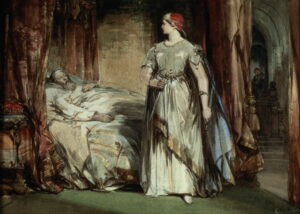
Shakespeare told some great stories, but historians will agree that real history often gets buried beneath the great Bard’s verses. The death of King Duncan was one of those exaggerations. For anybody who hasn’t read or seen Macbeth, in essence he meets three witches on the heath who plant the suggestion in his mind that he will be king. The best way to achieve this is to treacherously kill King Duncan in his bed (as Lady Macbeth goads him on), put the blame elsewhere and seize the throne. Righteous countrymen attack his castle in the end and restore the throne to Duncan’s heir.
Just for the record, when king Malcolm II died in 1034 at age 80, there were many claimants to the throne. Duncan’s claim was from Malcolm II through his mother’s side (the first of three daughters). Thorfinn of Orkney, the great Viking warrior, was Malcolm’s grandson through the third daughter, and was raised under the protection of the King. Malcolm eventually made him Earl of Caithness (the first time the title of Earl was used in Scotland); this could have been a consolation prize. Macbeth had a claim to the throne through his wife Grouch, who was considered the real heir based on the customary Tanist succession practiced in Scotland; her father’s claim had been put aside by Malcolm II in favor of Duncan.
So Malcolm II had cleared the way for his favorite grandson, although the 33 year-old Duncan did little to recommend himself to his contemporaries. He fought five wars in five years and lost them all. Ultimately, he made the mistake of trying to claim Caithness which was rightfully ruled by his cousin Thorfinn. This led to a sea battle where Duncan’s forces were ignominiously thrashed, and the king was forced to flee.
That same year in August, Duncan raised an army including many Irish mercenaries, and met either Thorfinn or Macbeth (or both) in the Battle of Burghead on the Moray Firth. This could be same battle I found reference to, stating that Macbeth killed Duncan at Pitgaveny, which was nearby. It was also recorded elsewhere that Duncan was killed by his own men immediately after the battle. Regardless of who actually killed him, it is clear that Duncan met his end on the battlefield rather than treacherously in bed. Macbeth was properly elected high king by a council of Scottish leaders, apparently without dissent. In fact, Macbeth ruled for 14 years. This is a far cry from the grasping, tortured protagonist of Shakespeare’s dark tragedy.
One thought on “Duncan was not killed in his bed by Macbeth”